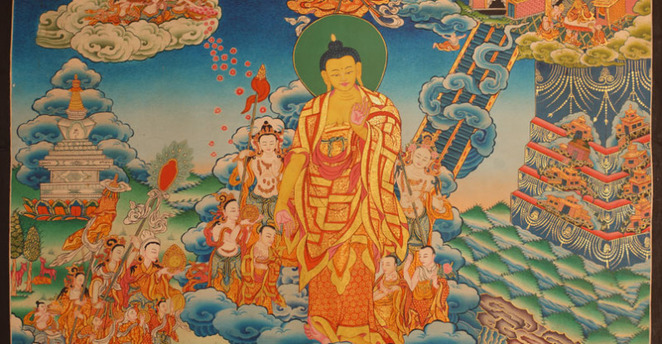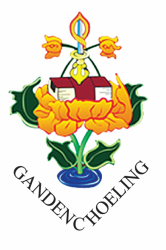The Month of Sakadava
June 9, 2017 is April 15th in Tibetan Calendar. It was the day Buddha Shakyamuni was born, became enlightened, and went to parinirvana. The whole month with name Sakadava is filled with special positive energy and great blessing. Below is the Ten Acts of Buddha composed by Nagajuna.
GREAT PRAISE OF THE TEN ACTS OF THE BUDDHA by Ārya Nāgārjuna
With skilful means and compassion, you were born in the Śākya clan, Unconquerable by others, you vanquished Māra's hordes, Your physical form resplendent, like a mountain of gold. To you, the King of the Śākyas, I pay homage!
You I shall praise, who first awakened the mind of enlightenment, then completed the accumulations of merit and wisdom, and now in this age, through the vast sway of your actions, have become the lord and protector of living beings
Homage to you that, having taught the gods, knew the time had come to tame the human world, and Descending from the god realm like a great elephant, foresaw the family of your birth and entered the womb of Māyādevī.
Homage to you, prince of the Śākyas, born after ten months In the auspicious Lumbinī grove, where Brahmā and Indra revered you, your supreme marks proving you were destined to be enlightened.
Homage to you, lion among men, in all your youthful vigour, displaying your prowess in the games at Anga Magadha, Where you triumphed over the proud contestants, so that not one could stand as your rival.
Homage to you, who, to comply with worldly convention, And avoid all misdeeds, took on a queen and courtiers And by acting with such skilful means, So you ruled the kingdom.
Homage to you, who saw that saṃsāra is wholly futile, Renounced the life of a householder, And, travelling through the sky, Ordained yourself before the Viśuddha Stūpa.
Homage to you, who, intent on persevering till enlightened, for six years practised austerities on the banks of the Nairañjanā, and taking diligence to its ultimate perfection, attained the supreme samādhi.
Homage to you, who, seeking to make meaningful, all your efforts, made throughout beginningless time, sat unmoving in the vajra posture beneath the bodhi-tree in Magadha and awakened into true buddhahood, attaining perfect enlightenment.

Homage to you, who, in your compassion, gazed at once upon living beings, then Turned the wheel of Dharma in sacred places like Varānasī, and established disciples in the three vehicles.
Homage to you that destroyed evil-minded opponents, by defeating the six teachers of the tīrthikas, Devadatta and the rest, as well as the maras in Varānasī;1 You were the mighty sage, victorious in battle.
Homage to you, who performed great miracles in Śravastī, unmatched in their splendour in all the three realms, and through the offerings made by gods, humans and other beings, caused the teachings to prosper and increase.
Homage to you, who, to spur the lazy on to the Dharma, left your body, though immortal and like a vajra, and passed into parinirvāṇa in the pure abode of Kuśinagara.
Homage to you, who, to show that you had not in reality perished, and so that beings of the future could gain merit, Emanated a wealth of relics, and caused Your remains to be divided into eight portions.
OM MUNE MUNE MAHA MUNE YE SOHA.(x108)
June 9, 2017 is April 15th in Tibetan Calendar. It was the day Buddha Shakyamuni was born, became enlightened, and went to parinirvana. The whole month with name Sakadava is filled with special positive energy and great blessing. Below is the Ten Acts of Buddha composed by Nagajuna.
GREAT PRAISE OF THE TEN ACTS OF THE BUDDHA by Ārya Nāgārjuna
With skilful means and compassion, you were born in the Śākya clan, Unconquerable by others, you vanquished Māra's hordes, Your physical form resplendent, like a mountain of gold. To you, the King of the Śākyas, I pay homage!
You I shall praise, who first awakened the mind of enlightenment, then completed the accumulations of merit and wisdom, and now in this age, through the vast sway of your actions, have become the lord and protector of living beings
Homage to you that, having taught the gods, knew the time had come to tame the human world, and Descending from the god realm like a great elephant, foresaw the family of your birth and entered the womb of Māyādevī.
Homage to you, prince of the Śākyas, born after ten months In the auspicious Lumbinī grove, where Brahmā and Indra revered you, your supreme marks proving you were destined to be enlightened.
Homage to you, lion among men, in all your youthful vigour, displaying your prowess in the games at Anga Magadha, Where you triumphed over the proud contestants, so that not one could stand as your rival.
Homage to you, who, to comply with worldly convention, And avoid all misdeeds, took on a queen and courtiers And by acting with such skilful means, So you ruled the kingdom.
Homage to you, who saw that saṃsāra is wholly futile, Renounced the life of a householder, And, travelling through the sky, Ordained yourself before the Viśuddha Stūpa.
Homage to you, who, intent on persevering till enlightened, for six years practised austerities on the banks of the Nairañjanā, and taking diligence to its ultimate perfection, attained the supreme samādhi.
Homage to you, who, seeking to make meaningful, all your efforts, made throughout beginningless time, sat unmoving in the vajra posture beneath the bodhi-tree in Magadha and awakened into true buddhahood, attaining perfect enlightenment.

Homage to you, who, in your compassion, gazed at once upon living beings, then Turned the wheel of Dharma in sacred places like Varānasī, and established disciples in the three vehicles.
Homage to you that destroyed evil-minded opponents, by defeating the six teachers of the tīrthikas, Devadatta and the rest, as well as the maras in Varānasī;1 You were the mighty sage, victorious in battle.
Homage to you, who performed great miracles in Śravastī, unmatched in their splendour in all the three realms, and through the offerings made by gods, humans and other beings, caused the teachings to prosper and increase.
Homage to you, who, to spur the lazy on to the Dharma, left your body, though immortal and like a vajra, and passed into parinirvāṇa in the pure abode of Kuśinagara.
Homage to you, who, to show that you had not in reality perished, and so that beings of the future could gain merit, Emanated a wealth of relics, and caused Your remains to be divided into eight portions.
OM MUNE MUNE MAHA MUNE YE SOHA.(x108)

BUDDHA’S RETURN FROM HEAVEN DAY
Today November 3rd marks the celebration of Buddha’s Return from Heaven Day.
‘On this day we celebrate Buddha’s return from the desire god realm called Land of the Thirty-three Heavens, where he had been to visit his mother who had been reborn there.
Traditionally this day also marks the end of the summer retreat. Every year, during the summer months, Buddha did a three-month retreat with his disciples. His reason for doing this was to avoid harming insects and other animals.
If we go out a lot during the summer months we will naturally kill more insects and other animals than at other times of the year. The nature of Buddhadharma is compassion – an unbiased compassion that is not just for human beings but for every living being, including animals.
In fact, we should have stronger compassion for animals than for human beings because animals suffer more. Human beings have better conditions and are more fortunate than animals. Because animals have so much suffering and no freedom, out of compassion Buddhists should try not to kill or disturb them. So, for three months during the summer, Buddha advised his disciples to retreat, staying always inside and living carefully and conscientiously.
One year during the annual summer retreat Buddha went to the Land of the Thirty-three Heavens. After his mother died she had taken rebirth in this god realm, so-called because it has thirty-three different types of god.
The king of this realm is called Indra. The Indra who was king at that time was also Buddha’s disciple and he invited Buddha to go there. So Buddha went to benefit his mother and also, at Indra’s request, to benefit the other gods living there. He stayed three months, and then returned on this day.
This day is therefore very special. It is said that if we engage in any kind of virtuous action on this day it becomes especially powerful and our merit greatly increases. For example, if we offer one single light offering this action is multiplied to become millions of light offerings.
On this day we should especially remember Buddha’s kindness.
We now have a special wisdom that understands that killing animals is a negative action, so we abandon killing. We now have a special wisdom that understands what love is and can distinguish between love and attachment, so we try to abandon attachment and increase our love. Thus, we have a wonderful opportunity to develop unbiased compassion for all living beings, and in this way we can gain the special realization of bodhichitta, which is the root of complete enlightenment.
We now have the chance to abandon our self-grasping, which is the source of all suffering and problems. We have the wisdom that understands what self-grasping is, how it harms us and how to abandon it. All this knowledge and all our wisdom realizations come from the kindness of Buddha Shakyamuni.
All Je Tsongkhapa’s books are commentaries to Buddha Shakyamuni’s teachings. They help to clarify them and make it easier for us to understand them. Nowadays human beings are very intelligent and knowledgeable about how to develop and produce external things, but their understanding or wisdom about the profound Dharma of the inner spiritual path is very poor and weak. Je Tsongkhapa made it very easy for us to understand this. He clarified everything and made it easy for us to integrate all of Buddha’s teachings in a very practical way.
Because Je Tsongkhapa’s books are commentaries to Buddha Shakyamuni’s teachings, when we are studying Je Tsongkhapa’s teachings we are studying Buddha Shakyamuni’s teachings, and when we are practicing Je Tsongkhapa’s teachings we are practicing Buddha’s teachings.
All the books we study on the General Program, Foundation Program, and Teaching Training Program, are commentaries to Je Tsongkhapa’s teachings. They clarify Je Tsongkhapa’s teachings and explain how to practice and integrate them into our everyday life. They are a special presentation, but in reality they are all commentaries to Je Tsongkhapa’s books. We are therefore studying Je Tsongkhapa’s teachings – and in doing this we are studying Buddha Shakyamuni’s teachings.
In reality, every teaching we study and practise comes fundamentally from Buddha Shakyamuni; all our wisdom that understands Dharma comes from his kindness. Realizing this we should dedicate all the virtues we accumulate today to fulfilling his wish.
What is Buddha’s wish? His main wish is that his teachings flourish throughout the world so that all living beings find release from the suffering ocean of samsara and attain permanent inner peace, permanent freedom, and eventually great enlightenment. Because the real method to find release from samsara is to practice Buddha’s teachings, unless they flourish in this world it is impossible to attain actual liberation.
Buddha doesn’t need anything for himself because he has completed everything – he has fulfilled all his personal wishes. His sole remaining wish is that living beings attain liberation and enlightenment through practicing his teachings. In other words, his wish is for pure Buddhadharma to flourish throughout the world to free all living beings from every kind of problem and suffering.
We should therefore dedicate all the virtues we accumulate today for this purpose.
A message from Geshe Jampa Lobsang La at Ganden Shartse Monastery
